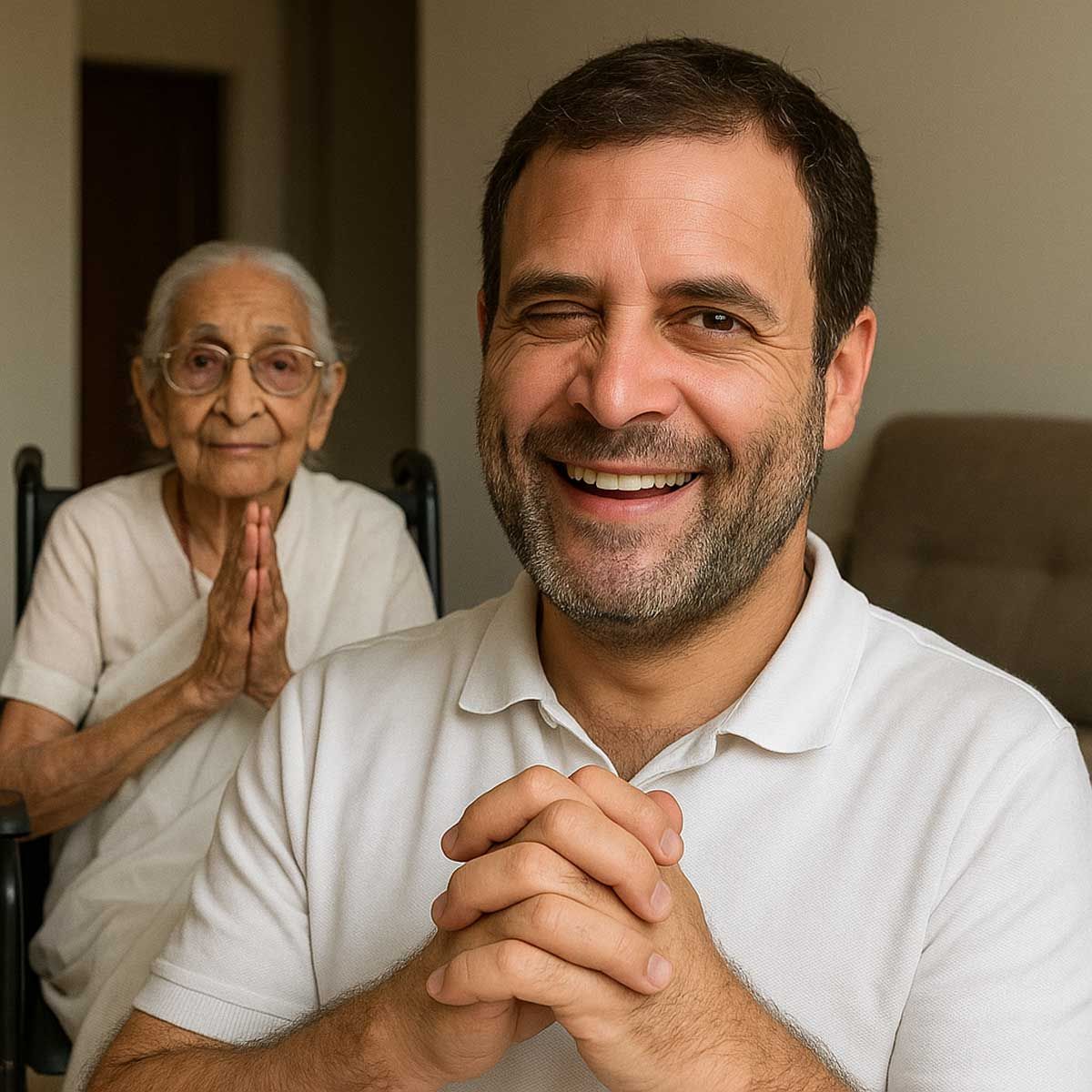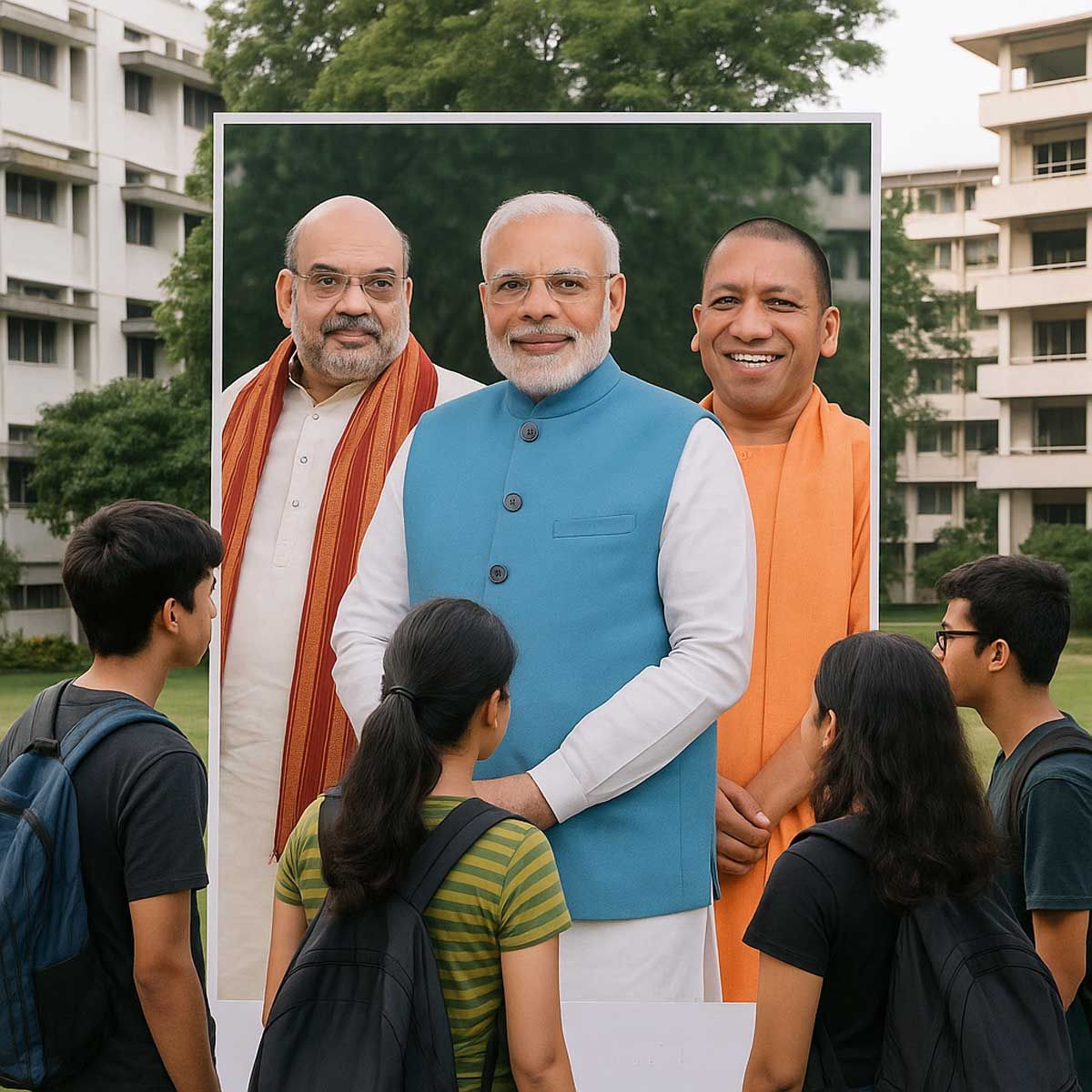More Coverage
Twitter Coverage
Satyaagrah
Written on
Satyaagrah
Written on
Satyaagrah
Written on
Satyaagrah
Written on
Satyaagrah
Written on
JOIN SATYAAGRAH SOCIAL MEDIA
India races to become the world’s third-largest economy, yet in a rare convergence US Treasury Secretary Scott Bessent, Pakistan’s Asim Munir, and Rahul Gandhi target Mukesh Ambani with tariffs, threats, and rhetoric to weaken India’s rise

India today finds itself at a decisive turning point. Its rapid GDP growth has positioned it as the fastest-growing large economy in the world, offering the promise of becoming a new pillar in the global economic system. With international supply chains shifting, India is stepping in as a trusted partner for manufacturing, digital technology, and consumer markets. The world now looks at India not as a follower, but as a country with the potential to become the third-largest economy globally.
This success has not come in isolation. It has been powered by India’s corporate giants—Reliance Industries, the Adani Group, Tata, Infosys, Wipro, and others. These companies have invested billions into crucial industries, from energy and retail to digital innovation, while employing millions of Indians both directly and indirectly. They have become the backbone of India’s growth story, symbols of ambition and self-confidence.
And yet, in the last few weeks, a strange and troubling pattern has emerged. Three powerful figures, seemingly disconnected from one another, have directed their attention at the same target: Mukesh Ambani, Chairman of Reliance Industries Limited, along with India’s corporate elite. These figures are US Treasury Secretary Scott Bessent, Pakistan’s Field Marshal Asim Munir, and India’s own Opposition leader Rahul Gandhi.
Individually, these statements may look like casual criticisms or political attacks. But when placed together, they take on a different meaning. They raise the uncomfortable question of whether this is mere coincidence, or if India’s corporate powerhouses are being deliberately targeted in a broader attempt to weaken the very foundation of the country’s economic rise.
|
Scott Bessent Targets Ambani: Tariffs, Russian Oil, and a Campaign to Discredit India
When US Treasury Secretary Scott Bessent appeared on CNBC this week, his words left little room for interpretation. He was unusually blunt in his criticism of India. Not only did he accuse the country of profiteering from discounted Russian crude oil, but he also pointed a direct finger at India’s wealthiest industrial families, with clear reference to Ambani, who owns major refineries.
Bessent claimed that “India’s richest families” were personally benefitting from the import of Russian oil while undermining Western sanctions. He went on to announce: “We have planned to up the tariffs on India, these are secondary tariffs for buying the sanctioned Russian oil.”
Backing his charge with numbers, Bessent said that before 2022, India bought less than 1% of its oil from Russia. However, after the Ukraine conflict, the share of Russian crude in India’s imports rose sharply. “Now, I believe, it’s up to 42%. So India is just profiteering… they made $16 billion on excess profits, some of the richest families in India.”
On the surface, his criticism sounded like a moral rebuke. But when looked at more closely, the weakness in the argument became clear.
India has always maintained that it will buy oil from the cheapest available source to safeguard its energy security. At a time of inflation, global supply disruptions, and sanctions, choosing discounted Russian oil was not profiteering—it was survival and pragmatism. Moreover, India was not alone. China, too, increased its imports of Russian crude, moving from 13% of its total before the war to 16% after. Yet, Bessent excused China, arguing it had a “diversified” energy basket. Why then was India being singled out?
It is also important to note that Reliance and other refiners purchased Russian crude under legitimate long-term contracts. Much of this oil was refined into petroleum products and then re-exported, ensuring stability in the global supply chain. Ironically, this was exactly the purpose of the G7’s $60 per barrel price cap—to keep Russian oil flowing while restricting Moscow’s windfall. By this logic, India was not undermining the West’s sanctions but complementing them.
Instead of recognizing this role, Bessent chose to vilify Indian corporates, branding them profiteers. The irony is sharp: American oil companies recorded record profits since 2022, yet it is India’s Ambanis and Adanis who are portrayed as villains.
This rhetoric is not just hollow—it is dangerous. By naming “India’s richest families”, Bessent sought to create mistrust within India, turning ordinary people against the very companies that provide them with jobs, energy, digital connectivity, telecom services, and retail essentials. In doing so, Washington appears to be attempting not just criticism, but a subtle delegitimisation of India’s economic story itself.
|
Asim Munir’s Threat to Ambani: Quranic Curse and Economic Sabotage
If Bessent’s rhetoric was meant to economically discredit India, Pakistan’s Field Marshal Asim Munir took a far darker turn—openly invoking religious symbolism and violent imagery.
At a private dinner in Tampa, Florida, Munir proudly told his diaspora audience that he had personally approved a social media post pairing Mukesh Ambani’s photograph with a Quranic verse. He revealed: “Ek tweet karwaya tha with Surah Fil and a picture of [industrialist] Mukesh Ambani to show them what we will do the next time.”
The symbolism was chilling. Surah Al-Fil, from the Quran, describes the divine destruction of enemy elephants. By linking it to Ambani, Munir was not making a casual remark—he was issuing a coded threat of annihilation, suggesting divine sanction for violence against India’s most successful businessman.
He didn’t stop there. Munir warned that Pakistan would begin its offensive from India’s east and then move westwards. This was more than casual boasting—it was a chilling admission of strategy, suggesting a plan to target India’s economic heart by going after its leading corporates.
In another metaphor, Munir compared India to a “Mercedes speeding down a highway” and Pakistan to a “dump truck full of gravel.” His point was unmistakable: even if Pakistan was weaker, it could still crash into India’s shining economy and cause serious damage.
This marks a dangerous shift in Pakistan’s posture. For decades, its military elite has spoken of Kashmir and nuclear threats. But now, Munir openly imagines what he calls “economic decapitation” of India—attacking icons like Ambani and other industrial leaders as symbolic targets.
|
Rahul Gandhi’s Rhetoric: Political Strategy of Distrust
The third figure in this unusual convergence is not a foreign leader but a domestic one—Rahul Gandhi. For years, Gandhi has made it his political trademark to repeatedly attack India’s corporate icons, especially Mukesh Ambani and Gautam Adani. In Parliament speeches, election campaigns, and even during international tours, Gandhi has hammered the idea that India’s biggest businesses are not national assets but government cronies. From his early slogan of a “suit-boot ki sarkaar” to the more recent label of an “Ambani-Adani nexus”, he has consistently framed India’s corporates as symbols of corruption and favoritism.
At first glance, these remarks could be dismissed as routine opposition politics. Yet, the timing and amplification of his rhetoric have frequently aligned with attacks from international quarters. In early 2023, when Hindenburg Research launched its short-seller report against the Adani Group, Gandhi quickly picked it up. He echoed its claims in Parliament, repeated them across media platforms, and turned what was intended as a financial strategy into a major political storm inside India.
The pattern did not stop there. Soon after, OCCRP, an organization funded by George Soros’s Open Society, issued follow-up reports. Once again, Gandhi seized the opportunity, citing these reports repeatedly, even though the Supreme Court of India later dismissed the allegations as unsubstantiated. Adding further fuel, Gandhi’s US tour saw him sharing stages with Soros-backed activists, many of whom are known for anti-India rhetoric. This blurred the boundary between legitimate domestic criticism and indirect participation in global efforts to undermine India’s corporate champions.
An unverified but widely-circulated report attributed to Sputnik India added another layer of intrigue. It claimed that Israel’s intelligence agency Mossad believed the overlap was no coincidence. According to the report, Mossad allegedly traced communications linking Hindenburg, Western activist networks, Chinese economic interests, and what it called a “key face from India’s opposition dynasty”: Rahul Gandhi.
By branding Ambani and Adani as corrupt again and again, Gandhi has created a narrative of doubt within India. Ordinary citizens and investors alike are told to distrust the very companies building infrastructure, telecom services, retail systems, and energy projects. Instead of celebrating these corporates as engines of India’s rise, Gandhi presents them as liabilities.
Whether intentional or not, this message ends up complementing the narratives of Scott Bessent and Asim Munir: that Ambani and Adani are profiteers who must be discredited, punished, or even destroyed.
The Convergence: A Three-Front Attack on India’s Growth
The sequence is striking. The US Treasury Secretary openly accuses India’s richest families of profiteering from Russian oil, threatening secondary tariffs. The Pakistani Army Chief invokes Quranic references, personally targeting Mukesh Ambani and even hinting at threats against the Jamnagar refinery. Meanwhile, India’s Opposition leader relentlessly repeats the idea that Ambani and Adani are beneficiaries of political favoritism, sowing domestic suspicion.
Taken individually, these might seem like unrelated outbursts. But when seen together, they reveal something larger. This is no longer coincidence—it is a convergence of forces that, knowingly or unknowingly, undermines the backbone of India’s economic progress.
The combined effect is clear: weaken investor confidence, delegitimise India’s corporates, and attempt to stall the momentum of the world’s fastest-growing major economy. If such efforts succeed, they could derail India’s trajectory at the very moment when the country is on the verge of overtaking Germany to become the third-largest economy in the world.
Why India’s Industrialists Are National Assets
It is essential to remember that Ambani’s Reliance is not just another private company. It is India’s largest employer outside the government, the pioneer of a digital revolution through Jio, a key player in ensuring energy security, and now a massive investor in renewable and green technologies.
Similarly, Adani Group’s infrastructure and ports are critical to India’s logistics and connectivity. The Tata Group, Infosys, and Wipro have powered India’s dominance in IT and global services.
To attack these corporations is not to attack individuals—it is to attack India’s development itself. Without Jio’s disruptive entry into telecom, India’s digital economy would not have grown at its current pace. Without Adani’s ports, global trade integration would have lagged. Without Tata’s global acquisitions, India’s corporate reputation abroad would have been much weaker.
This is why adversaries focus on these giants. By undermining their credibility, they aim to slow down India’s momentum and weaken its future.
The real agenda becomes visible when the narratives are broken down:
Scott Bessent’s remarks about “India’s richest families” are not just about Russian oil. They are about planting suspicion in the minds of Indians, making the middle class feel that Ambani’s success is at their expense.
Asim Munir’s Quranic threat is not about religious metaphors. It is about instilling fear among India’s business elite, discouraging them from ambitious projects that could transform India’s economy.
Rahul Gandhi’s rhetoric is not limited to criticizing Prime Minister Modi. It is about normalizing distrust of India’s corporates, presenting success as inherently corrupt.
Each strand, in its own way, leads to the same conclusion: to slow down India’s rise.
Protecting India’s Growth Story
India must recognise that its corporate champions are an integral part of its national power. Protecting them from smear campaigns, coded threats, or baseless political rhetoric is as vital as protecting its borders.
This does not mean corporates should be above scrutiny or accountability. But when foreign leaders issue baseless allegations, when hostile generals give veiled threats, or when domestic politicians echo international attacks, these must be seen for what they truly are—attempts to derail India’s growth trajectory at a decisive moment in history.
As India races toward becoming the world’s third-largest economy, the world is watching. Some nations celebrate this rise. Others fear it. And those who fear will use every tool—propaganda, financial reports, or political allies—to tarnish, intimidate, and weaken the very engines of India’s progress.
Ambani, Adani, Tata, Infosys, Wipro, and others are more than companies. They represent India’s ambitions, its economic strength, and its future. To undermine them is to undermine India itself. And that is something no Indian, across party lines, should ever permit.
 Support Us
Support Us
Satyagraha was born from the heart of our land, with an undying aim to unveil the true essence of Bharat. It seeks to illuminate the hidden tales of our valiant freedom fighters and the rich chronicles that haven't yet sung their complete melody in the mainstream.
While platforms like NDTV and 'The Wire' effortlessly garner funds under the banner of safeguarding democracy, we at Satyagraha walk a different path. Our strength and resonance come from you. In this journey to weave a stronger Bharat, every little contribution amplifies our voice. Let's come together, contribute as you can, and champion the true spirit of our nation.
 |  |  |
| ICICI Bank of Satyaagrah | Razorpay Bank of Satyaagrah | PayPal Bank of Satyaagrah - For International Payments |
If all above doesn't work, then try the LINK below:
Please share the article on other platforms
DISCLAIMER: The author is solely responsible for the views expressed in this article. The author carries the responsibility for citing and/or licensing of images utilized within the text. The website also frequently uses non-commercial images for representational purposes only in line with the article. We are not responsible for the authenticity of such images. If some images have a copyright issue, we request the person/entity to contact us at This email address is being protected from spambots. You need JavaScript enabled to view it. and we will take the necessary actions to resolve the issue.
Related Articles
- Congress leader spreads vaccine hesitancy again, this time claims newborn calves are slaughtered for their serum. Here is the truth
- 'Badhai ho India': India crosses one billion vaccination milestone
- 2-IN-1 ‘peaceful protest' and ‘Target railways’ toolkit activated: Congress workers stop train while protesting against Supremo Rahul Gandhi’s ED questioning in National Herald scam, and chanting anti-government slogans against Agnipath Scheme
- "मियाँ पप्पू": Rajiv Gandhi abolished India's 3-decade-old inheritance tax right before the transfer of Indira's estate to her grandchildren; Rahul Gandhi now proposes reintroducing wealth redistribution, a strategy historically proven to fail globally
- "I used to think my life was a tragedy, but now I realize it's a comedy": Ghulam Nabi Azad quits Congress Party, exposes family ran remote control MMS Govt and said ‘Non-serious Rahul Gandhi destroyed party, his PAs and guards taking decisions’
- Dhruv Rathee fans mark YouTuber Karolina Goswami for targeted harassment after she exposed his lies
- "गुंडा": Rahul Gandhi’s aggression hides a deeper game; its not Modi but his INDI allies he’s out to outshine—37 parties, 17 UP seats, 2/65 in GJ, MP, CG—can Congress reclaim WB, Bihar, UP, or will global woke trust crumble amid a web of alliance betrayal
- Raj Thackeray roared today at the ‘Uttarsabha rally ‘ while rebutting counter-allegations against him made by Maha-Vikas-Aghadi leaders: He spoke fiercely demanding UCC, unequivocally supported Hindutva, and lashed out at MVA leaders
- From delivering sinister anti-Hindu speech at book launch, bunch of lies, and of course Hindumisia Rahul Gandhi went on to incite people to retaliatory violence: Repeatedly using the term ‘kutte jaise maara’ in an attempt to provoke sentiments
- Same Congress which is offering freebies in the states during polls has not paid rent for Lutyens Delhi bungalows for almost a decade, Rent worth crores pending: RTI revelation
- Congress created magic on paper to make 17 crores poor by changing the estimated poverty line in a rural area and urban area: PM Modi tears into Congress’ ‘Garibi hatao’ facade, exposes the reality of 2013 report
- Sam Pitroda, draped in a cloak of telecom innovation, yet mired in ₹150 crore C-DoT scandal and exposed by the Nambiar Committee; a story of Congress-crafted illusion, where financial irregularities & political puppetry overshadowed technological promises
- Hours after poll strategist Prashant Kishor rejected Congress’ offer to join the party, Rahul Gandhi has been untraceable as he left India for a foreign visit: Priyanka Gandhi too has left for an undisclosed foreign location
- During ‘Kheti Bachao Yatra’ in Kurukshetra Shehjada Gandhi claimed of throwing China out from Indian Territory ‘in 15 minutes’: From Nehru’s Himalayan blunder to UPA’s silence as China took over Indian land in Ladakh
- "BJP has spread kerosene all over the country. You need one spark and we'll be in big trouble": A Criminal psychology study of Rahul Gandhi statement using Kerosene and link of "SAFFRON TERROR” word coined by that time ISI chief




























